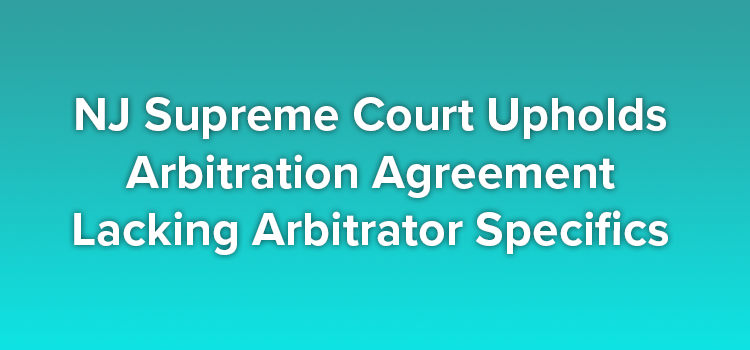In Flanzman v. Jenny Craig, Inc., the Supreme Court of New Jersey held that an arbitration agreement that did not name the arbitrator, designate an arbitration organization to conduct the proceeding, or set forth a process for the parties to choose an arbitrator was still enforceable.

Facts of Flanzman v. Jenny Craig, Inc.
In approximately July 1991, Jenny Craig, Inc. hired Marilyn Flanzman to work as a weight maintenance counselor. In May 2011, Flanzman signed a document entitled “Arbitration Agreement” (Agreement) in connection with her employment. In the Agreement, Flanzman and JC USA agreed to resolve their disputes by “final and binding arbitration” that would take the place of “a jury or other civil trial.” Although the Agreement stated that an arbitrator would resolve the parties’ disputes, it did not name the arbitrator, designate an arbitration organization to conduct the proceeding, or set forth a process for the parties to choose an arbitrator.
In February 2017, Flanzman’s managers informed her that her hours would be reduced from 35 to 19 hours per week. Two months later, Flanzman’s managers further reduced her hours to approximately thirteen hours per week. In June 2017, they reduced her hours to three hours per week, at which point she left her employment. At that time, Flanzman was 82-years-old.
Flanzman brought suit, asserting claims for age discrimination, constructive discharge, discriminatory discharge, and harassment. Relying on the Agreement, defendants moved to dismiss the complaint and to compel arbitration. Defendants contended that California law governed the Agreement and that the Agreement was enforceable. The trial court granted the motion to dismiss and ordered the parties to arbitrate Flanzman’s claims. It held that California law governed the arbitration and that the arbitral forum is assumed to be California.
The Appellate Division agreed and reversed the order compelling arbitration. “We hold that the parties lacked a ‘meeting of the minds’ because they did not understand the rights under the arbitration agreement that ostensibly foreclosed plaintiff’s right to a jury trial,” the panel stated. The appeals court further held that if the parties select no “arbitral institution,” they must at least identify “the general process for selecting an arbitration mechanism or setting” in order for their agreement to be binding.
NJ Supreme Court’s Decision in Flanzman v. Jenny Craig, Inc.
The New Jersey Supreme Court reversed, holding that the Agreement is enforceable. “Under principles of New Jersey law that generally govern contracts, the Agreement at issue is valid and enforceable,” Justice Anne Patterson wrote.
According to the court, the New Jersey Arbitration Act (NJAA), which provides a default procedure for the selection of an arbitrator and generally addresses the conduct of the arbitration, clearly expresses the Legislature’s intent that an arbitration agreement may bind the parties without designating a specific arbitrator or arbitration organization or prescribing a process for such a designation. The court further concluded that given the NJAA’s default provisions supplying terms missing from an arbitration agreement, a court’s enforcement of an agreement supplemented by those terms comports with common-law principles of New Jersey contract law.
The New Jersey Supreme Court also found that the Agreement satisfied the standard set forth in Atalese v. U.S. Legal Services Group, 219 N.J. 430, 443 (2014), which provides that “under New Jersey law, any contractual ‘waiver-of-rights provision must reflect that [the party] has agreed clearly and unambiguously’ to its terms.” According to the state’s highest court, the Appellate Division erred in setting forth a requirement for arbitration agreements that was not imposed in Atalese, mandating either the designation in the agreement of an “arbitral institution” or a description of “the general process for selecting an arbitration mechanism or setting.”
“That principle is not among the ‘grounds as exist at law or in equity for the revocation of any contract,’ based on Atalese,” Justice Patterson wrote. “No New Jersey statutory provision or prior decision has elevated the selection of an ‘arbitral institution’ or the designation of a ‘general process for selecting an arbitration mechanism or setting’ to the status of essential contract terms, without which an arbitration agreement must fail.”
“To the contrary, the NJAA [New Jersey Arbitration Act] makes clear that its default provision for the selection of an arbitrator may operate in the absence of contractual terms prescribing such procedures,” added Patterson.
Given that the Agreement is silent as to the governing law and the jurisdiction in which the arbitration should be held, the court found that was an issue is for the arbitrator to resolve.
